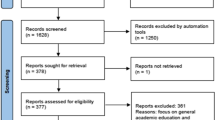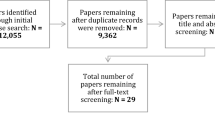Abstract
The use of simulations in European Studies is becoming more widespread, given the possibilities of immersing students in complex issues and building substantive knowledge and affective understanding. We identify a number of barriers to the full realisation of this potential. Drawing on observations from various games, it is suggested that for a successful simulation there must be: learning objectives clear to all participants; alignment between those objectives, game play and assessment; and a meaningful feedback process.
Similar content being viewed by others
References
Biggs, J. (1996) ‘Enhancing teaching through constructive alignment’, Higher Education 32 (3): 347–364.
Biggs, J. (2003) Teaching for Quality Learning at University, Buckingham: Open University Press.
Bobot, L. and Goergen, A. (2010) ‘Case study: teaching European negotiations: the EU chocolate directive simulation’, International Negotiation 15 (2): 301–323.
Chin, J., Dukes, R. and Gamson, W. (2009) ‘Assessment in simulation and gaming: a review of the last 40 years’, Simulation and Gaming 40 (4): 553–568.
Dekkers, J. and Donatti, S. (1981) ‘The integration of research studies on the use of simulation as an instructional strategy’, The Journal of Educational Research 74 (6): 424–427.
Galatas, S. (2006) ‘A simulation of the council of the European Union: assessment of the impact on student learning’, PS: Political Science and Politics 39 (1): 147–151.
Gredler, M. (1992) Designing and Evaluating Games and Simulations: A Process Approach, London: Kogan Page.
Guetzkow, H. and Jensen, L. (1966) ‘Research activities on simulated international processes’, Background 9 (4): 261–274.
Hertel, J. and Millis, B. (2002) Using Simulations to Promote Learning in Higher Education: An Introduction, Sterling: Stylus Publishing.
Kaunert, C. (2009) ‘The European Union simulation: from problem-based learning (PBL) to student interest’, European Political Science 8 (2): 254–265.
Lantis, J. (1998) ‘Simulations and experiential learning in the international relations classroom’, International Negotiation 3 (1): 39–57.
Meerts, P. (1994) ‘Simulating Topical Diplomatic Negotiations’, in R. Armstrong, F. Percival and D. Saunders (eds.) The Simulation and Gaming Yearbook, Volume 2, Interactive Learning, London: Kogan Page, pp. 133–141.
Newmann, W. and Twigg, J. (2000) ‘Active engagement of the intro IR student: a simulation approach’, PS: Political Science and Politics 33 (4): 835–842.
Raymond, C. and Usherwood, S. (2013) ‘Assessment in simulations’, Journal of Political Science Education 9 (2): 157–167.
Sabin, P. (2012) Simulating War: Studying Conflict through Simulation Games, London: Continuum.
Schick, L. (2008) ‘Breaking frame in a role-play simulation: a language socialization perspective’, Simulation Gaming 39 (2): 184–197.
Tonks, D. (2002) ‘Using marketing simulations for teaching and learning: reflections on an evolution’, Active Learning in Higher Education 3 (2): 177–194.
Usherwood, S. (2009a) ‘Grounding simulations in reality: a case study from an undergraduate politics degree’, On the Horizon 17 (4): 296–302.
Usherwood, S. (2009b) ‘Enhancing student immersion in negotiation-based learning environments’, International Journal of Learning 16 (7): 607–614.
Usherwood, S. (2013) ‘How to do simulation games’, available at: https://sites.google.com/site/howtodosimulationgames/, accessed 15 February 2013.
Van Dyke, G., Declair, E. and Loedel, P. (2000) ‘Stimulating simulations: making the European Union a classroom reality’, International Studies Perspectives 1 (2): 145–159.
Verba, S. (1963) ‘Simulation, reality, and theory in international relations’, World Politics 16 (3): 490–519.
Zeff, E. (2003) ‘Negotiating in the European council: a model European Union format for individual classes’, International Studies Perspectives 4 (3): 265–274.
Zuckerman, D. and Horn, R. (1973) The Guide to Simulations/Games for Education and Training, Lexington: Information Resources.
Acknowledgements
A very early draft of this article was presented to Annual Conference of the University Association for Contemporary European Studies, Bruges, Belgium, September 2010. Thanks must be made to comments from Victor Asal, Steven Curtis, Simon Lightfoot, Heidi Maurer, Jocelyn Mawdsley, Alexandra Mihai, Nina Kollars, Chad Raymond, Amanda Rosen and others.
Author information
Authors and Affiliations
Rights and permissions
About this article
Cite this article
usherwood, s. Constructing Effective Simulations of the European Union for Teaching: Realising the Potential. Eur Polit Sci 13, 53–60 (2014). https://doi.org/10.1057/eps.2013.29
Published:
Issue Date:
DOI: https://doi.org/10.1057/eps.2013.29




